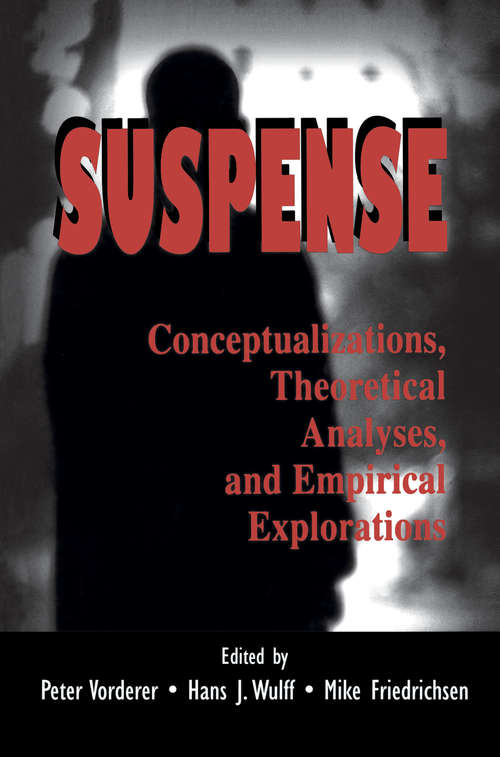Suspense: Conceptualizations, Theoretical Analyses, and Empirical Explorations (Routledge Communication Series)
By: and and
Sign Up Now!
Already a Member? Log In
You must be logged into Bookshare to access this title.
Learn about membership options,
or view our freely available titles.
- Synopsis
- This volume begins with the general assumption that suspense is a major criterion for both an audience's selection and evaluation of entertaining media offerings. This assumption is supported not only by the popularity of suspenseful narratives, but also by the reasons users give for their actual choice of media contents. Despite this, there is no satisfying theory to describe and explain what suspense actually is, how exactly it is caused by films or books, and what kind of effect it has on audiences. This book's main objective is to provide that theory by bringing together scholars from different disciplines who are working on the issue. The editors' goal is to reflect the "state of the art" as much as it is to highlight and encourage further developments in this area. There are two ways of approaching the problem of describing and explaining suspense: an analysis of suspenseful texts or the reception process. Researchers who follow the more text-oriented approach identify the uncertainty of the narrative outcome, the threat or danger for the protagonist, the play with time delay, or other factors as important and necessary for the production of suspense. The more reception-oriented scholar focuses on the cognitive activities of audiences, readers' expectations, the curiosity of onlookers, their emotions, and their relationships with the protagonists. A correspondence between the two seems to be quite difficult, though necessary to determine. Both perspectives are important in order to describe and explain suspense. Thus, the editors utilize the thesis that suspense is an activity of the audience (reader, onlooker, etc.) that is related to specific features and characteristics of the text (books, films, etc.). Their question is: What kind of relation? The answer comes from finding out how, why, and which elements of the text cause effects that are experienced as suspense. Scholars from semiotics, literary criticism, cultural studies, and film theory assess the problem from a text-oriented point of view, dealing primarily with the how and which. Other scholars present the psychological perspective by focusing on the cognitive and emotional processes that underlie viewers' experience of suspense; that is, the reception theory tries to answer the question of why suspenseful texts may be experienced as they are.
- Copyright:
- 1996
Book Details
- Book Quality:
- Publisher Quality
- Book Size:
- 376 Pages
- ISBN-13:
- 9781136687686
- Related ISBNs:
- 9780805819663, 9780805819656, 9780203811252
- Publisher:
- Taylor and Francis
- Date of Addition:
- 05/10/23
- Copyrighted By:
- Lawrence Erlbaum Associates, Inc.;Routledge
- Adult content:
- No
- Language:
- English
- Has Image Descriptions:
- No
- Categories:
- Nonfiction, Social Studies, Language Arts, Communication
- Submitted By:
- Bookshare Staff
- Usage Restrictions:
- This is a copyrighted book.
- Edited by:
- Peter Vorderer
- Edited by:
- Hans Jurgen Wulff
- Edited by:
- Mike Friedrichsen
Reviews
Other Books
- by Mike Friedrichsen
- by Peter Vorderer
- by Hans J. Wulff
- in Nonfiction
- in Social Studies
- in Language Arts
- in Communication
